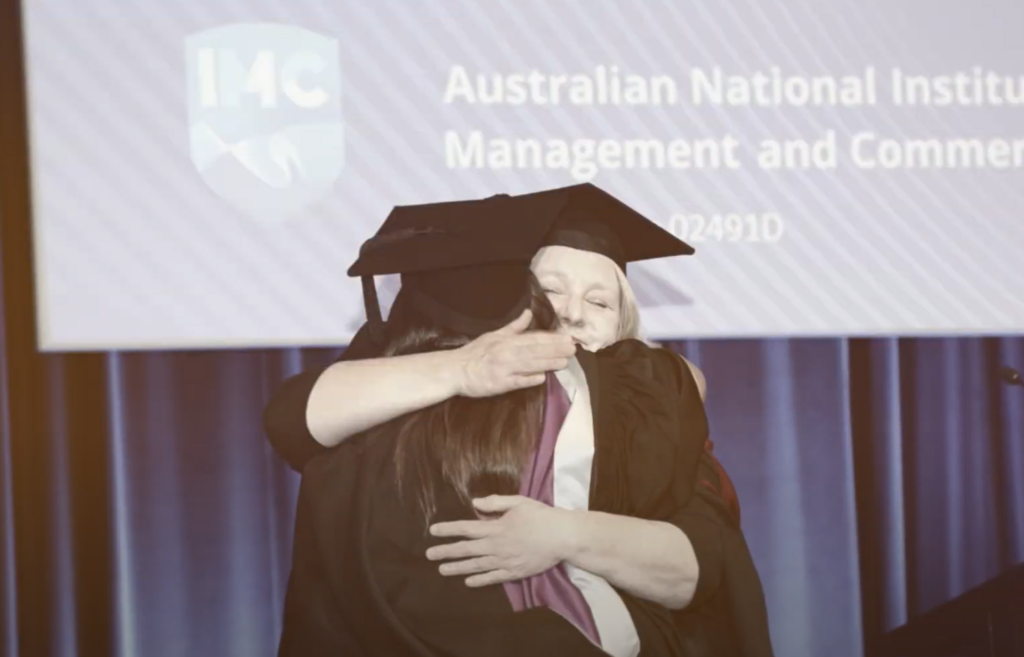CRICOS: 087704D
Bachelor of Laws
Start your journey
PROGRAM OVERVIEW
A Law degree at IMC offers a transformative journey toward the award of a Bachelor of Laws (LLB) degree. The degree is designed to equip students with the intellectual, critical and professional skills needed for success in the practice of law and other professional career paths. Our program is meticulously crafted to empower students with not just legal knowledge, but also the intellectual, critical, and professional skills essential for thriving in the ever-evolving legal landscape and beyond.
Upon successful completion, students can enrol in another institution for the Graduate Diploma in Legal Practice, and after successful completion may apply to the Legal Profession Admission Board for admission as legal practitioners.

DURATION
4 years, 8 semesters
(8 semesters, 2 semesters per year), for students admitted without prior tertiary study.
APPLICATION DATE
Refer to key dates
DELIVERY SITE
On campus (Eveleigh NSW 2015)
ENGLISH LANGUAGE REQUIREMENTS
IELTS Academic A minimum overall score of 6.5 with no individual band less than 6.0
COURSE STRUCTURE
The compulsory curriculum in the Bachelor of Laws degree will require students to complete 15 compulsory units and 14 elective units + 3 Business electives to complete the degree program. Recognition of Prior Learning (RPL) is available and will be assessed in accordance with IMC’s RPL policy and procedure, and LLB RPL guidelines.
The 15 compulsory units include the ‘Priestley 11’ and units required for practice and registration in NSW. Each semester a range of elective units are also offered to complement the areas of knowledge and legal skills gained in compulsory units.
TLLB208 Civil Dispute Resolution TLLB209 Ethics & Professional Conduct Law Elective Total Total UOC: 24 |
Elective units may be chosen to complement or supplement areas of compulsory legal knowledge. Elective units may vary according to the course review.
*Prerequisite/Co-requisite Requirements
Elective units may be chosen to complement or supplement areas of compulsory legal knowledge. Elective units may vary according to the course review.
ADMISSION CRITERIA
Applicants with recent secondary education (within the past two years)
Applicants whose admission is secondary education undertaken at school TAFE or other VET or higher education provider (Australian or overseas equivalent) that was completed (or will be) in the current year or within the previous two year.
Australian Year 12 Students
- Have completed the equivalent of the NSW Higher School Certificate (HSC) in Australia, achieving a level equivalent to an indicative ATAR score of 85; OR
- Have passed the International Baccalaureate examination with a result of 35 points or higher.
Selection Rank Adjustment
- If you do not meet the standard criteria for admission, you may be considered under the our Adjustment Factors scheme.
Adjustment factors for the LLB
- An applicant may receive a maximum of 10 Adjustment Points through a combination of subject adjustment points and other adjustment/equity points.
Subject Adjustment
- Applicants may receive a maximum of 3 adjustment points per preference in their application.
- Points may be gained for achievement in English Advanced Band 6, English Extension 1 or 2 Band 3 – 4; or Mathematics extension 1 or 2 Band 3 – 4.
Educational/Social Disadvantage
- Rural and regional performers
- These form part of the National Access Scheme. 5 Adjustment points may be awarded for each factor.
Indigenous Entry Program (to be supplied separately).
For more information please refer to our Adjustment Factors page or contact our admissions team for more information via email at application@imc.edu.au.
IMC will accept and assess official translations of overseas qualifications from the following countries
IMC will accept and assess official translations of overseas qualifications from the following countries
Hong Kong Diploma of Secondary Education (HKDSE) 21
United Entrance Certificate (UEC) [Malaysia] 10
General Certificate of Education (GCE) Advanced Level 11
Ontario Secondary School Diploma (OSSD) 80
British Columbia Certificate of Graduation (Canada) 5.6
Alberta High School Diploma (Canada) 86
ISC & CBSE [India] 80%
ISBE [India] 90%
SAT [US] 1350
Abitur 2.7
Thailand Certificate of Secondary Education 3.0
Bang Tot Nghiep Trung Hoc Pho Thong 8.5
STPM or Matrikulasi 3.22
Kuwait General School Secondary Certificate 84
Applicants with higher education study
Applicants whose highest level of study enrolment since leaving secondary education is a higher education course.
Entry Requirement
- The applicant holds a Bachelor degree at AQF level seven or equivalent, with a GPA of 4.0 out of 7.0, from a recognised higher education provider; OR
- The applicant has been admitted to candidature for a law degree in an Australian higher education provider.
FURTHER COURSE DETAILS
- Career Options
- Recognition of Prior Learning (RPL)
- Assessment Methods
A law degree opens many doors to professional careers. Legal practice is one career option. Before admission to legal practice, graduates of the School of Law, like most other law graduates in Australia, will need to undertake an additional Practical Legal Training (PLT) course which supplements the study undertaken at law school.
For those who do not have an immediate interest in legal practice, graduates will be able to use their research, analytical, communication and negotiation, and other skills learnt in their law course in a range of career pathways. A law degree is an excellent preparation for many professional roles in our increasingly complex, interrelated, globalised environment.
Recognition of Prior Learning
- Recognition of Prior Learning (RPL) is available and will be assessed in accordance with IMC’s RPL policy and procedure. Please refer to the Application for Credit Recognition form and the RPL policy and procedure for further details.
In the Bachelor of Laws course students will build a set of academic and professional legal skills in research, oral and written communication skills, self-management, ethical consciousness and teamwork. Assessment methods are designed to encourage learning, provide feedback and measure achievement of unit learning outcomes. Forms of assessment vary among units and include quizzes, tests and open book examinations (both online and in traditional invigilated format), case notes, research assignments, hypothetical problem solving exercises, client written advices, moots and ADR and advocacy exercises.
IMC's School of Law

The Law degree at IMC’s School of Law is fully accredited and thus offers an alternative to university study in law. Our accreditation includes approval from the Commonwealth Tertiary Education Quality and Standards Agency (TEQSA) and the NSW Legal Profession Admission Board.
Our School of Law’s accredited program meets the requirements for length and volume of study as well as covering the requisite areas of legal knowledge for admission to legal practice in NSW. These 11 areas of law and procedure are commonly known as the Priestley 11. They are contained in Schedule 1 of the Legal Profession Uniform Admission Rules.[1]

The 1st
The first non-university provider tertiary education provider of an LLB degree that enables its graduates to apply for admission as professional lawyers.

Top-class Facilities
A Moot Court, with excellent facilities so students feel industry ready. Our Moot Court provides an immersive learning environment where students can practice and refine their advocacy skills.

Boost Your Career Prospects
IMC delivers innovative programs such as Career Edge. 92.4% of students who attend Career Edge Program are employed within three months after graduation.





